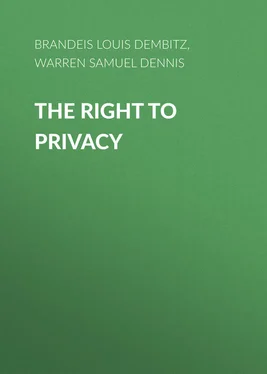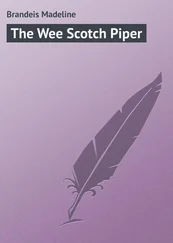Louis Brandeis - The Right to Privacy
Здесь есть возможность читать онлайн «Louis Brandeis - The Right to Privacy» — ознакомительный отрывок электронной книги совершенно бесплатно, а после прочтения отрывка купить полную версию. В некоторых случаях можно слушать аудио, скачать через торрент в формате fb2 и присутствует краткое содержание. Жанр: foreign_antique, foreign_prose, на английском языке. Описание произведения, (предисловие) а так же отзывы посетителей доступны на портале библиотеки ЛибКат.
- Название:The Right to Privacy
- Автор:
- Жанр:
- Год:неизвестен
- ISBN:нет данных
- Рейтинг книги:5 / 5. Голосов: 1
-
Избранное:Добавить в избранное
- Отзывы:
-
Ваша оценка:
- 100
- 1
- 2
- 3
- 4
- 5
The Right to Privacy: краткое содержание, описание и аннотация
Предлагаем к чтению аннотацию, описание, краткое содержание или предисловие (зависит от того, что написал сам автор книги «The Right to Privacy»). Если вы не нашли необходимую информацию о книге — напишите в комментариях, мы постараемся отыскать её.
The Right to Privacy — читать онлайн ознакомительный отрывок
Ниже представлен текст книги, разбитый по страницам. Система сохранения места последней прочитанной страницы, позволяет с удобством читать онлайн бесплатно книгу «The Right to Privacy», без необходимости каждый раз заново искать на чём Вы остановились. Поставьте закладку, и сможете в любой момент перейти на страницу, на которой закончили чтение.
Интервал:
Закладка:
What is the nature, the basis, of this right to prevent the publication of manuscripts or works of art? It is stated to be the enforcement of a right of property; 25 25 "The question will be whether the bill has stated facts of which the court can take notice, as a case of civil property, which it is bound to protect. The injunction cannot be maintained on any principle of this sort, that if a letter has been written in the way of friendship, either the continuance or the discontinuance of the friendship affords a reason for the interference of the court." Lord Eldon in Gee v. Pritchard, 2 Swanst. 402, 413 (1818). "Upon the principle, therefore, of protecting property, it is that the common law, in cases not aided or prejudiced by statute, shelters the privacy and seclusion of thought and sentiments committed to writing, and desired by the author to remain not generally known." Knight Bruce, V. C., in Prince Albert v. Strange, 2 DeGex & Sm. 652, 695. "It being conceded that reasons of expediency and public policy can never be made the sole basis of civil jurisdiction, the question, whether upon any ground the plaintiff can be entitled to the relief which he claims, remains to be answered; and it appears to us that there is only one ground upon which his title to claim, and our jurisdiction to grant, the relief, can be placed. We must be satisfied, that the publication of private letters, without the consent of the writer, is an invasion of an exclusive right of property which remains in the writer, even when the letters have been sent to, and are still in the possession of his correspondent." Duer, J., in Woolsey v. Judd, 4 Duer, 379, 384 (1855).
and no difficulty arises in accepting this view, so long as we have only to deal with the reproduction of literary and artistic compositions. They certainly possess many of the attributes of ordinary property: they are transferable; they have a value; and publication or reproduction is a use by which that value is realized. But where the value of the production is found not in the right to take the profits arising from publication, but in the peace of mind or the relief afforded by the ability to prevent any publication at all, it is difficult to regard the right as one of property, in the common acceptation of that term. A man records in a letter to his son, or in his diary, that he did not dine with his wife on a certain day. No one into whose hands those papers fall could publish them to the world, even if possession of the documents had been obtained rightfully; and the prohibition would not be confined to the publication of a copy of the letter itself, or of the diary entry; the restraint extends also to a publication of the contents. What is the thing which is protected? Surely, not the intellectual act of recording the fact that the husband did not dine with his wife, but that fact itself. It is not the intellectual product, but the domestic occurrence. A man writes a dozen letters to different people. No person would be permitted to publish a list of the letters written. If the letters or the contents of the diary were protected as literary compositions, the scope of the protection afforded should be the same secured to a published writing under the copyright law. But the copyright law would not prevent an enumeration of the letters, or the publication of some of the facts contained therein. The copyright of a series of paintings or etchings would prevent a reproduction of the paintings as pictures; but it would not prevent a publication of a list or even a description of them. 26 26 "A work lawfully published, in the popular sense of the term, stands in this respect, I conceive, differently from a work which has never been in that situation. The former may be liable to be translated, abridged, analyzed, exhibited in morsels, complimented, and otherwise treated, in a manner that the latter is not. "Suppose, however, – instead of a translation, an abridgment, or a review, – the case of a catalogue, – suppose a man to have composed a variety of literary works ('innocent,' to use Lord Eldon's expression), which he has never printed or published, or lost the right to prohibit from being published, – suppose a knowledge of them unduly obtained by some unscrupulous person, who prints with a view to circulation a descriptive catalogue, or even a mere list of the manuscripts, without authority or consent, does the law allow this? I hope and believe not. The same principles that prevent more candid piracy must, I conceive, govern such a case also. "By publishing of a man that he has written to particular persons, or on particular subjects, he may be exposed, not merely to sarcasm, he may be ruined. There may be in his possession returned letters that he had written to former correspondents, with whom to have had relations, however harmlessly, may not in after life be a recommendation; or his writings may be otherwise of a kind squaring in no sort with his outward habits and worldly position. There are callings even now in which to be convicted of literature, is dangerous, though the danger is sometimes escaped. "Again, the manuscripts may be those of a man on account of whose name alone a mere list would be matter of general curiosity. How many persons could be mentioned, a catalogue of whose unpublished writings would, during their lives or afterwards, command a ready sale?" Knight Bruce, V. C., in Prince Albert v. Strange, 2 DeGex & Sm. 652, 693.
Yet in the famous case of Prince Albert v. Strange, the court held that the common-law rule prohibited not merely the reproduction of the etchings which the plaintiff and Queen Victoria had made for their own pleasure, but also "the publishing (at least by printing or writing), though not by copy or resemblance, a description of them, whether more or less limited or summary, whether in the form of a catalogue or otherwise." 27Likewise, an unpublished collection of news possessing no element of a literary nature is protected from piracy. 28
That this protection cannot rest upon the right to literary or artistic property in any exact sense, appears the more clearly when the subject-matter for which protection is invoked is not even in the form of intellectual property, but has the attributes of ordinary tangible property. Suppose a man has a collection of gems or curiosities which he keeps private: it would hardly be contended that any person could publish a catalogue of them, and yet the articles enumerated are certainly not intellectual property in the legal sense, any more than a collection of stoves or of chairs. 29
The belief that the idea of property in its narrow sense was the basis of the protection of unpublished manuscripts led an able court to refuse, in several cases, injunctions against the publication of private letters, on the ground that "letters not possessing the attributes of literary compositions are not property entitled to protection;" and that it was "evident the plaintiff could not have considered the letters as of any value whatever as literary productions, for a letter cannot be considered of value to the author which he never would consent to have published." 30But these decisions have not been followed, 31and it may now be considered settled that the protection afforded by the common law to the author of any writing is entirely independent of its pecuniary value, its intrinsic merits, or of any intention to publish the same, and, of course, also, wholly independent of the material, if any, upon which, or the mode in which, the thought or sentiment was expressed.
Although the courts have asserted that they rested their decisions on the narrow grounds of protection to property, yet there are recognitions of a more liberal doctrine. Thus in the case of Prince Albert v. Strange, already referred to, the opinions both of the Vice-Chancellor and of the Lord Chancellor, on appeal, show a more or less clearly defined perception of a principle broader than those which were mainly discussed, and on which they both placed their chief reliance. Vice-Chancellor Knight Bruce referred to publishing of a man that he had "written to particular persons or on particular subjects" as an instance of possibly injurious disclosures as to private matters, that the courts would in a proper case prevent; yet it is difficult to perceive how, in such a case, any right of property, in the narrow sense, would be drawn in question, or why, if such a publication would be restrained when it threatened to expose the victim not merely to sarcasm, but to ruin, it should not equally be enjoined, if it threatened to embitter his life. To deprive a man of the potential profits to be realized by publishing a catalogue of his gems cannot per se be a wrong to him. The possibility of future profits is not a right of property which the law ordinarily recognizes; it must, therefore, be an infraction of other rights which constitutes the wrongful act, and that infraction is equally wrongful, whether its results are to forestall the profits that the individual himself might secure by giving the matter a publicity obnoxious to him, or to gain an advantage at the expense of his mental pain and suffering. If the fiction of property in a narrow sense must be preserved, it is still true that the end accomplished by the gossip-monger is attained by the use of that which is another's, the facts relating to his private life, which he has seen fit to keep private. Lord Cottenham stated that a man "is entitled to be protected in the exclusive use and enjoyment of that which is exclusively his," and cited with approval the opinion of Lord Eldon, as reported in a manuscript note of the case of Wyatt v. Wilson, in 1820, respecting an engraving of George the Third during his illness, to the effect that "if one of the late king's physicians had kept a diary of what he heard and saw, the court would not, in the king's lifetime, have permitted him to print and publish it;" and Lord Cottenham declared, in respect to the acts of the defendants in the case before him, that "privacy is the right invaded." But if privacy is once recognized as a right entitled to legal protection, the interposition of the courts cannot depend on the particular nature of the injuries resulting.
Читать дальшеИнтервал:
Закладка:
Похожие книги на «The Right to Privacy»
Представляем Вашему вниманию похожие книги на «The Right to Privacy» списком для выбора. Мы отобрали схожую по названию и смыслу литературу в надежде предоставить читателям больше вариантов отыскать новые, интересные, ещё непрочитанные произведения.
Обсуждение, отзывы о книге «The Right to Privacy» и просто собственные мнения читателей. Оставьте ваши комментарии, напишите, что Вы думаете о произведении, его смысле или главных героях. Укажите что конкретно понравилось, а что нет, и почему Вы так считаете.












